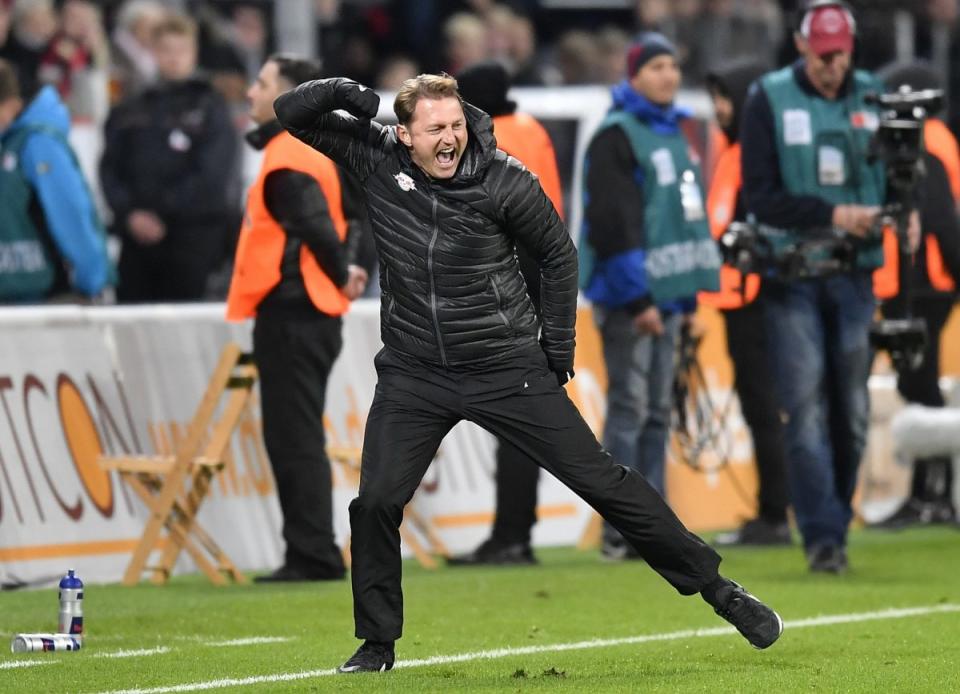Say good morning to the bad guy: Controversial RB Leipzig here to stay

RB Leipzig is one of the most hated clubs in all of Europe, if not the most hated. To say so is nothing new.
RB Leipzig is also winning. That’s not new either.
The latest result, a full three points at presumptive Bundesliga heavyweight Bayer Leverkusen, pushed RB Leipzig to the very top of the table. That could change after tomorrow’s Der Klassiker, as a Bayern Munich win over Borussia Dortmund would see the Bavarians regain the league lead on goal differential, and they remain title favorites.
But surely there’s enough evidence now that RB Leipzig, cunningly adept, exceedingly adolescent and (depending on who you ask) flagrantly amoral, is not going anywhere anytime soon.
Widely excoriated across Germany and even other parts of Europe, the hatred stems from the club’s governing practices behind the scenes. RB Leipzig was founded a mere seven years ago when Red Bull seized the club license of a fifth-division side, which helped it circumvent the legal obstacles in establishing a soccer club in the German Football Association, or DFB.
The DFB operates under a so-called “50+1 rule” to ensure a majority of voting rights are kept with the clubs’ members to help them keep business in the black and protect against takeovers by external investors, like the ones that have bankrolled the rises of Chelsea and Manchester City in England.
RB Leipzig has almost gleefully tinkered with the rule, charging absurd sums of money to become a member and therefore wield voting power in the first place. Annual fees can be up to €1,000, outpacing even Bayern Munich’s asking prices. The club’s officials have defended the incredibly strict membership with thin excuses such as avoiding the influence of ultras, but what they’re doing is plainly transparent.
Almost all of the 17 members are employed by Red Bull or associated with the energy drink giant, and the company’s considerable finances are being poured into the club. The “RB” doesn’t technically stand for Red Bull – DFB rules won’t allow it, so the official name is “RasenBallsport” – but the kits are sponsored by Red Bull, the team plays at Red Bull Arena, and even the official Twitter handle is @DieRotenBullen, which translates to “the red bulls.”
So it’s not hard to see how one could accuse RB Leipzig of thumbing its nose at German soccer, and German soccer by and large is fighting back. The numerous protests have verged from creative to unruly to downright hideous, and they may not stop until at least the end of the season.

Only now, they’re starting to ring more hollow. Stocking a club’s board with corporate influence doesn’t seem to be much of a sin in today’s game. Bayern Munich’s board is dotted with managers of major German financial services, sporting goods manufacturers and car companies, so is the problem really money, or is the problem that Red Bull is not German?
The other chief criticism leveled against RB Leipzig, that it was established simply as a way to print money for Red Bull, is eroding with each passing week.
The club is off to the best start ever for a newly promoted Bundesliga side, having won eight matches and drawn three through the first 11 fixtures. That run includes wins over Dortmund and Bayer Leverkusen and draws away to Hoffenheim and FC Köln, all of whom are currently in the top eight. Yet RB Leipzig has yet to really unleash the full strength of its financial backing, with the reported sum of €10 million for German striker Timo Werner last summer representing the club record transfer fee.
So how has RB Leipzig been able to do it? Well, for as much uprooting as the club’s done off the pitch, the game-to-game tactics and operation are really quite grounded.
Manager Ralph Hasenhüttl spent the last three seasons helping FC Ingolstadt gain promotion to the Bundesliga and then finish mid-table last season, and his appointment last summer has been a perfect fit. He’s good with a limited budget, has a deep knowledge of German soccer from his playing days, and has lent RB Leipzig a tactical flexibility that gives it a chance to win points in every match.
Perhaps the key figure is Ralf Rangnick, who’s been RB Leipzig’s sporting director since 2012 and has scouted young, talented and cost-effective players. Of course, money still played a factor, as RB Leipzig outspent over half the Bundesliga clubs in 2015 despite playing in the second tier. Red Bull has also set up other clubs like Red Bull Salzburg that essentially act as feeder clubs, from which RB Leipzig has plucked first-team stalwarts like Stefan Ilsanker, Neiby Keïta and Péter Gulásci.
But they’ve been smart buys, as have versatile attacker Marcel Sabitzer, dangerous winger Emil Forsberg and stout defender Willi Orban. Forsberg and Orban, in fact, combined to score the winner against Bayern Leverkusen:
Top of the league? Top of the league!! Promoted @RBLeipzig_EN pass Bayern for at least 1 day on Willi Orban’s winner https://t.co/JJfmtRW5Ob
— FOX Soccer (@FOXSoccer) November 18, 2016
Other players, such as Yussuf Poulsen, Diego Demme and Marvin Compper have been with RB Leipzig for a while now, balancing the new faces with veteran presences. Even Bayern Munich saw fit to raid the club’s talent by signing German international Joshua Kimmich almost two years ago.
RB Leipzig still doesn’t play on the same transfer market playing field as Bayern or Dortmund or the other major clubs in Germany, but that will soon change. Rangnick has promised to lift the club’s self-imposed €3 million annual salary cap, which means bigger buys are almost surely in the offing.
And what a situation they’d be coming to. RB Leipzig has the money to pay astronomical wages and build the world-class facilities and compete in a success-starved region of Germany. (No East German team has won the Bundesliga since reunification in 1990, and the city of Leipzig only won two of the 44 East German championships from 1948 to 1991.)
Ultimately, whether or not people have a problem with RB Leipzig and how they do things is largely reflective of how one feels about the sport. Are you a traditionalist who turns the other cheek toward the soulless side of the sport whenever possible? Do you embrace the influence of cash in the 21st century, accepting that in order for certain clubs to pool galaxies of stars and give us sumptuous mega-clashes, soccer’s hierarchy must be extremely top-heavy? Are you somewhere in the middle?
Those at the top have certainly taken notice. Dortmund CEO Hans-Joachim Watzke dismissed RB Leipzig as a “soft drink”, while Liverpool manager Jurgen Klopp has stumped for his former club. Slow starts by the traditional elite in the Bundesliga have opened the door for someone to take their place. Reigning champion Bayern Munich is now playing this weekend for the right to keep pace with RB Leipzig, not put more distance between the two.
The bad guys are here. Don’t say goodnight to them, say good morning. Because they’re probably going to be here for a long time.


